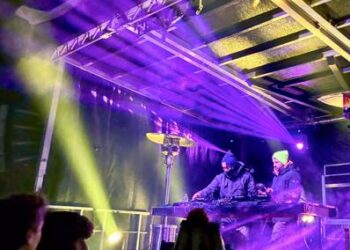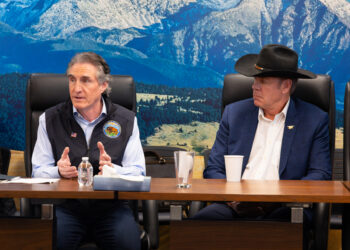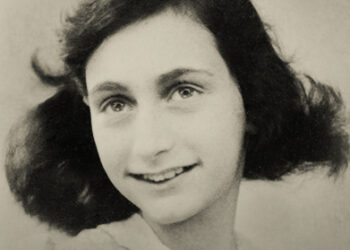Montana State University’s archive department provides a peek into the past
Introduction by Mira Brody VP MEDIA
While it’s quiet in Montana State University’s archive and special collections department on the second floor of the university’s library, that’s not for lack of information. Myself, EBS Staff Writer Jen Clancey and Digital Media Lead Fischer Genau, are participating in a program called Blind Date With the Archives, hosted by the archive center through the month of October as a way to get more people engaged with the campus’ robust collection of historical documents.
On three large oak desks, we’ve carefully organized—with the help of Curator Mel Pomeroy and her staff—collections of photo slides, old maps, journals and government records that tell stories from those who roamed Gallatin Valley and Montana’s streets long before we did.
“October is National Archives Month. It’s something that happens every year, and archives across the country are looking for ways to participate,” Pomeroy said. “This year we just wanted to find a new way to invite people to come experience the archives. When people come in they are overwhelmed by the complex catalogs. This helped narrow down to fun engaging with a select menu.”
Inspired by the Blind Date with a Book programs often seen in libraries and bookstores, Pomeroy and archive staff put their heads together and created a teaser menu, a short list of topics that range from the local histories of Indigenous people, Bridger Bowl Ski Area and Yellowstone National Park. Pomeroy said many people either are unaware that the archives exist, are unsure if they are open to the public or are overwhelmed by their volume. Blind Date was a way to welcome new historians in an approachable manner.
While day-to-day, the archives center serves a range of users—including university classes, faculty members conducting research, scholars working on projects, journalists seeking historical resources, or individuals researching family genealogy—Pomeroy and her team hope to dispel the notion that archives are exclusive or intimidating.
“There’s no point in preserving these materials if people don’t get to experience them,” she said. “We’re not here to gatekeep what people want to look for.”
Pomeroy was surprised by the number of people on campus who participated; the event provided an opportunity to share this valuable resource with colleagues and community members who might not have otherwise visited. The MSU archives are home to some of the most robust historical research on trout and salmonids, history on Montana and the American West, Montana State University and Native Americans, to name only a few.
While she hopes to host Blind Date again in February, on-theme for Valentine’s Day, Pomeroy encourages anyone, student, faculty or general public, to visit the archives’ website to learn more about the center, talk to a librarian, or schedule an appointment to browse the incredible slice of history available in Bozeman.
The Explore Big Sky team wanted to share with you, our readers, some of the topics we found most interesting on our date. We hope you feel inspired to take on a date with history yourself.
Bridger Bowl: Records, reports, board minutes and photographs
Researcher: Mira Brody
For my Blind Date, I dove into a folder about Bridger Bowl Ski Area, and while I’ve only been skiing there for the last decade, it provided a glimpse into what it was like from its conception in 1954, when it first registered as a corporation. The corporation’s board, with the help of 60 volunteers, finally installed the area’s first platter lift, which took its first riders up in January 1955, putting Bridger on the map.


My archive materials were a mixture of hand-typed board minutes, visitation data, weather monitoring, purchase forms for chairlifts—including the ski hill’s famous double red chairs—original ski area maps, as well as 35-millimeter slide transparencies. Like many archives, they were donated, these in the early 1980s by Donald Belding, one of Bridger Bowl’s first officers.
I viewed the transparencies through a small slide viewer over a lit board. The tiny photographs revealed some semblance that time had passed: a severe lack of helmets and Gore-Tex, a defunct ski ramp, the casual use of avalanche mortars and a much-less-crowded parking lot. But it did prove that one thing has not changed—people’s excitement to ski their local hill.
Bernice K. Koch Scrapbook: a personal look at Yellowstone in the 30s
Researcher: Fischer Genau
I’d never been on a blind date before this experience, and I must say, it did not disappoint. My date was a little old for me though.
Ninety-one years old to be exact, as I had the pleasure of flipping through Bernice K. Koch’s scrapbook of photographs from Yellowstone National Park between 1931 and 1934. The collection included images of Bernice, who was a seasonal worker at the park for several summers, and her peers performing at what appeared to be a staff talent show, posing beside a dead bear (yikes), and donning strange outfits for the “Pack Rats Fashion Show.” It also included a letter from a coworker and an autograph book signed by her coworkers, which looked a lot like my middle school yearbook (though I think the term “HAGS” had yet to be invented) except I could barely make out the writing which was mostly in beautiful, looping cursive.


As a writer, my mind was immediately swimming with thoughts of a story on Yellowstone’s “savages”—that’s what they called seasonal workers—in the first few decades of the park. They were probably around my age or younger, but 100 years ago, people just looked different. Those photos were taken during the Great Depression, and many of the young men smiling out of those photos likely went on to be drafted in World War II. That world is barely recognizable to someone like me who was born in 2000. Nonetheless I recognized myself and my friends in Bernice and hers, a youthful bunch who headed west to have an adventure.
When I’m writing or researching a piece, I do most of my sleuthing online, but after my blind date, I realize that there’s so much more to be discovered. While the internet is a digital maelstrom of competing data and advertising, the information housed in MSU’s archives is carefully organized and curated by Mel and the staff there, and it contains all sorts of gems that would be difficult or impossible to find online. Plus, it’s so much more satisfying to pour over an ancient scrapbook or magnify old photo slides with a loupe than it is to stare at my computer.
Who knows, maybe this date will turn into a real relationship!
Montana State sororities and the Big Sky Resort master plan
Researcher: Jen Clancey
As a part of the Blind Date program, I viewed newspaper clippings, letters and pamphlets about a curfew placed on sororities at the school in the 1930s, resulting in an 11 p.m. cutoff instead of midnight on weekends. Students in Greek organizations boycotted classes for four days until the president at the time, Alfred Atkinson, heard the news of rebellion and returned to campus after being away. It took weeks of conferencing between students and university leaders for the former midnight curfew to be reinstated.

I also viewed the Big Sky, Montana master plan by David Jay Flood from 1970. The collection of documents wasn’t a part of the Blind Date program at the MSU Archives, but the team graciously collected Big Sky materials that could give EBS a glimpse at Big Sky’s past people and publications. An illustration of preliminary plans for a mall at the base of Lone Mountain caught my attention. With a circular and central pavilion and two-story glass store fronts lining a large walkway, the drawing showed sleek, ‘70s era architecture in the area at Big Sky Resort’s base.
Pay the archives a visit
EBS extends its thanks to Pomeroy and the archives team for their time and attention during our visit and encourage the community to take advantage of this local resource.














